谓语动词的单复数
谓语动词单复数用法

谓语动词单复数用法(总2页) -CAL-FENGHAI.-(YICAI)-Company One1-CAL-本页仅作为文档封面,使用请直接删除谓语动词单复数用法:主谓一致是指:1)语法形式上要一致,即单复数形式与谓语要一致。
2)意义上要一致,即主语意义上的单复数要与谓语的单复数形式一致。
3)就近原则,即谓语动词的单复形式取决于最靠近它的词语,一般来说,不可数名词用动词单数,可数名词复数用动词复数。
There is much water in the thermos.但当不可数名词前有表示数量的复数名词时,谓语动词用复数形式。
Ten thousand tons of coal were produced last year.1 并列结构作主语时谓语用复数Reading and writing are very important.注意:当主语由and连结时,如果它表示一个单一的概念,即指同一人或同一物时,谓语动词用单数,and 此时连接的两个词前只有一个冠词。
The iron and steel industry is very important to our life.2 主谓一致中的靠近原则1)当there be 句型的主语是一系列事物时,谓语应与最邻近的主语保持一致。
There is a pen, a knife and several books on the desk..There are twenty boy-students and twenty-three girl-students in the class.2)当either… or… 与neither… nor,连接两个主语时,谓语动词与最邻近的主语保持一致。
如果句子是由here, there 引导,而主语又不止一个时,谓语通常也和最邻近的主语一致。
Either you or she is to go.Here is a pen, a few envelops and some paper for you.3 谓语动词与前面的主语一致当主语后面跟有with, together with, like, except, but, no less than, as well as 等词引起的短语时,谓语动词与前面的主语一致。
如何确定谓语动词的单复数形式
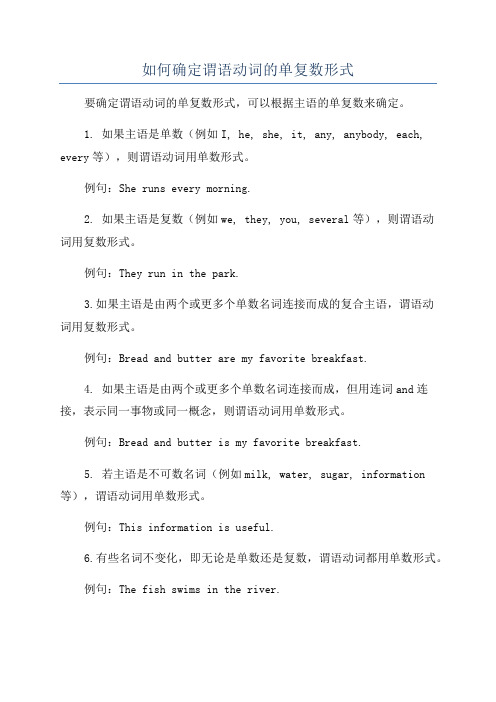
如何确定谓语动词的单复数形式
要确定谓语动词的单复数形式,可以根据主语的单复数来确定。
1. 如果主语是单数(例如I, he, she, it, any, anybody, each, every等),则谓语动词用单数形式。
例句:She runs every morning.
2. 如果主语是复数(例如we, they, you, several等),则谓语动
词用复数形式。
例句:They run in the park.
3.如果主语是由两个或更多个单数名词连接而成的复合主语,谓语动
词用复数形式。
例句:Bread and butter are my favorite breakfast.
4. 如果主语是由两个或更多个单数名词连接而成,但用连词and连接,表示同一事物或同一概念,则谓语动词用单数形式。
例句:Bread and butter is my favorite breakfast.
5. 若主语是不可数名词(例如milk, water, sugar, information 等),谓语动词用单数形式。
例句:This information is useful.
6.有些名词不变化,即无论是单数还是复数,谓语动词都用单数形式。
例句:The fish swims in the river.
需要注意的是,有些动词有特殊的单复数形式,例如goes, does等。
在使用这些动词时需要根据语法规则进行变化。
同时,也有一些名词在单
数和复数形式上没有变化,例如sheep, deer等。
高三复习-不定代词作主语时谓语动词用什么
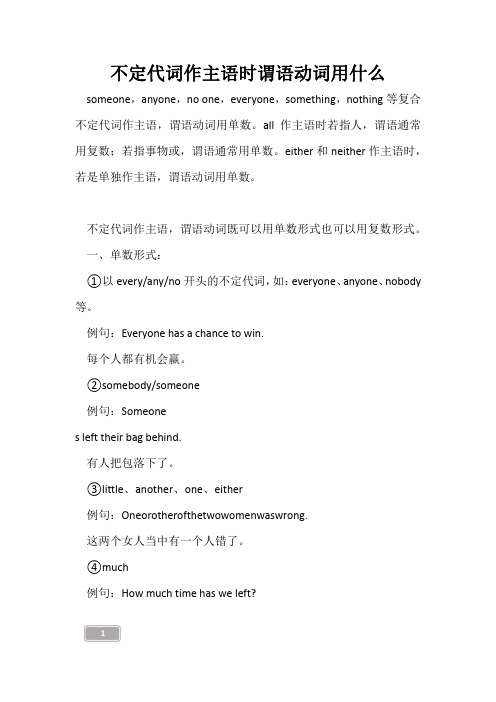
不定代词作主语时谓语动词用什么someone,anyone,no one,everyone,something,nothing等复合不定代词作主语,谓语动词用单数。
all作主语时若指人,谓语通常用复数;若指事物或,谓语通常用单数。
either和neither作主语时,若是单独作主语,谓语动词用单数。
不定代词作主语,谓语动词既可以用单数形式也可以用复数形式。
一、单数形式:①以every/any/no开头的不定代词,如:everyone、anyone、nobody 等。
例句:Everyone has a chance to win.每个人都有机会赢。
②somebody/someone例句:Someones left their bag behind.有人把包落下了。
③little、another、one、either例句:Oneorotherofthetwowomenwaswrong.这两个女人当中有一个人错了。
④much例句:How much time has we left?我们还剩多少时间?二、复数形式①many、(a)few、both例句:Both women were French.两名妇女都是法国人。
三、可单可复①当all做主语时,常代表三个以上的人,谓语动词用复数形式;指事物或情况时。
往往表示“—切”、“所有的”意思,常被看作单数意义,谓语动词用单数形式。
例句:All are here. 所有人都在这了。
All is known. 所有的事情都知道了。
②none只具有名词性质,可以代替人和事物,表示“三者(以上)都不”,“没有一个人(一件事物)。
做主语时,如果谈到的是所有人的情况,动词多用复数形式;如果谈每个人的状况,则多用单数形式。
例句:None of us are / is afraid of difficulties. 我们都不会害怕困难。
None of them has a bike. 他们没一个人有自行车。
谓语动词单复数用法

谓语动词单复数用法:主谓一致是指:1)语法形式上要一致,即单复数形式与谓语要一致。
2)意义上要一致,即主语意义上的单复数要与谓语的单复数形式一致。
3)就近原则,即谓语动词的单复形式取决于最靠近它的词语,一般来说,不可数名词用动词单数,可数名词复数用动词复数。
There is much water in the thermos.但当不可数名词前有表示数量的复数名词时,谓语动词用复数形式。
Ten thousand tons of coal were produced last year.1 并列结构作主语时谓语用复数Reading and writing are very important.注意:当主语由and连结时,如果它表示一个单一的概念,即指同一人或同一物时,谓语动词用单数,and 此时连接的两个词前只有一个冠词。
The iron and steel industry is very important to our life.2 主谓一致中的靠近原则1)当there be 句型的主语是一系列事物时,谓语应与最邻近的主语保持一致。
There is a pen, a knife and several books on the desk..There are twenty boy-students and twenty-three girl-students in the class.2)当either… or… 与neither… nor,连接两个主语时,谓语动词与最邻近的主语保持一致。
如果句子是由here, there引导,而主语又不止一个时,谓语通常也和最邻近的主语一致。
Either you or she is to go.Here is a pen, a few envelops and some paper for you.3 谓语动词与前面的主语一致当主语后面跟有with, together with, like, except, but, no less than, as well as 等词引起的短语时,谓语动词与前面的主语一致。
如何确定谓语动词的单复数形式

All the employees e*cept the youngest one (work) very hardII .主语的"数〞决定谓语动词的形式。
1."不可数名词、可数名词单数、单数代词、不定式〔短语〕、动名词〔短语〕〞或"从句〞等作主语,用单数谓语形式。
e.g.①The work is important . 这项工作重要。
②To serve the country is our duty . 为祖国效劳是我们的义务。
③How and why he left wasa sad story . 他离开的经过和原因是一段伤心的经历。
2. 复数的名词、代词一般接复数谓语形式。
e.g.①The children are taken good care of . 孩子们得到很好的照料。
②They have gone to Chengdu . 他们去**了。
II. 以"and 〞或"both… and〞连接的并列主语:1.通常作复数用。
e.g.①Plastics and rubber never rot . 塑料和橡胶从不腐烂。
②What hesays and what he does do not agree. 他言行不一致。
③Both Tom and I are fond of medicine . 我和汤姆都喜欢医学。
2. 如果并列主语指的是"同一个〞人〔事、物、抽象概念〕,作单数用。
e.g.①The worker and writer has e . 这位工人作家来了。
②A cart and horse was seen in the distance .远处能看见有一套马车。
③Truth and honesty is the best policy . 真诚是最好的策略。
3. "and〞前、后的单数词语都有"each,every ,many ,a ,no〞等修饰时,仍作单数用。
谓语动词单复数
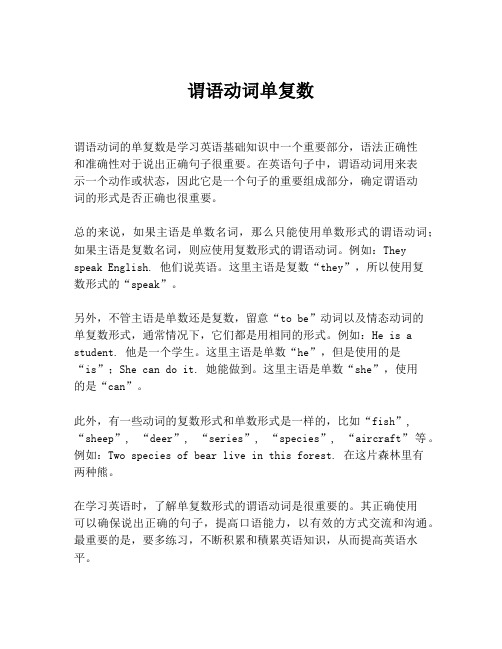
谓语动词单复数
谓语动词的单复数是学习英语基础知识中一个重要部分,语法正确性
和准确性对于说出正确句子很重要。
在英语句子中,谓语动词用来表
示一个动作或状态,因此它是一个句子的重要组成部分,确定谓语动
词的形式是否正确也很重要。
总的来说,如果主语是单数名词,那么只能使用单数形式的谓语动词;如果主语是复数名词,则应使用复数形式的谓语动词。
例如:They speak English. 他们说英语。
这里主语是复数“they”,所以使用复
数形式的“speak”。
另外,不管主语是单数还是复数,留意“to be”动词以及情态动词的
单复数形式,通常情况下,它们都是用相同的形式。
例如:He is a student. 他是一个学生。
这里主语是单数“he”,但是使用的是“is”;She can do it. 她能做到。
这里主语是单数“she”,使用
的是“can”。
此外,有一些动词的复数形式和单数形式是一样的,比如“fish”, “sheep”, “deer”, “series”, “species”, “aircraft”等。
例如:Two species of bear live in this forest. 在这片森林里有
两种熊。
在学习英语时,了解单复数形式的谓语动词是很重要的。
其正确使用
可以确保说出正确的句子,提高口语能力,以有效的方式交流和沟通。
最重要的是,要多练习,不断积累和積累英语知识,从而提高英语水平。
如何确定谓语动词的单复数形式
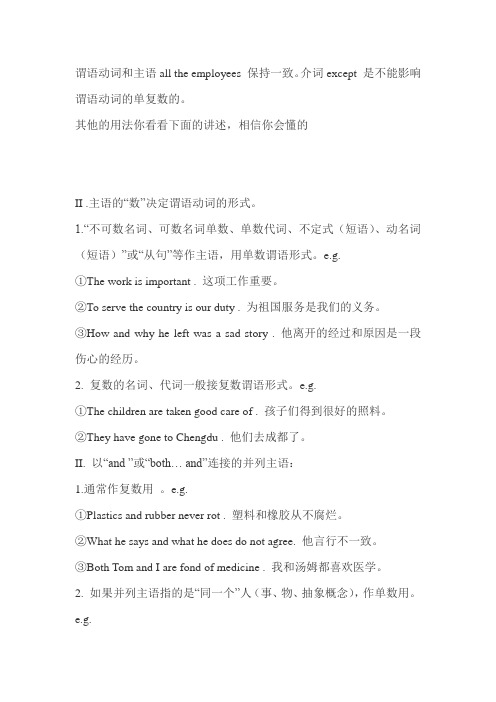
谓语动词和主语all the employees 保持一致。
介词except 是不能影响谓语动词的单复数的。
其他的用法你看看下面的讲述,相信你会懂的II .主语的“数”决定谓语动词的形式。
1.“不可数名词、可数名词单数、单数代词、不定式(短语)、动名词(短语)”或“从句”等作主语,用单数谓语形式。
e.g.①The work is important . 这项工作重要。
②To serve the country is our duty . 为祖国服务是我们的义务。
③How and why he left was a sad story . 他离开的经过和原因是一段伤心的经历。
2. 复数的名词、代词一般接复数谓语形式。
e.g.①The children are taken good care of . 孩子们得到很好的照料。
②They have gone to Chengdu . 他们去成都了。
II. 以“and ”或“both… and”连接的并列主语:1.通常作复数用。
e.g.①Plastics and rubber never rot . 塑料和橡胶从不腐烂。
②What he says and what he does do not agree. 他言行不一致。
③Both Tom and I are fond of medicine . 我和汤姆都喜欢医学。
2. 如果并列主语指的是“同一个”人(事、物、抽象概念),作单数用。
e.g.①The worker and writer has come . 这位工人作家来了。
②A cart and horse was seen in the distance . 远处能看见有一套马车。
③Truth and honesty is the best policy . 真诚是最好的策略。
3. “and”前、后的单数词语都有“each,every ,many ,a ,no”等修饰时,仍作单数用。
如何确定谓语动词的单复数形式

谓语动词和主语all the employees保持一致。
介词except是不能影响谓语动词的单复数的。
其他的用法你看看下面的讲述,相信你会懂的II .主语的“数”决定谓语动词的形式。
1.“不可数名词、可数名词单数、单数代词、不定式(短语)、动名词(短语)”或“从句”等作主语,用单数谓语形式。
e.g.①The work is important .这项工作重要。
②To serve the country is our duty .为祖国服务是我们的义务。
③How and why he left was a sad story .他离开的经过和原因是一段伤心的经历。
2.复数的名词、代词一般接复数谓语形式。
e.g.①The children are taken good care of .孩子们得到很好的照料。
②They have gone to Chengdu .他们去成都了。
II.以“and ”或“both… and”连接的并列主语:1.通常作复数用。
e.g.①Plastics and rubber never rot .塑料和橡胶从不腐烂。
②What he says and what he does do not agree.他言行不一致。
③Both Tom and I are fond of medicine .我和汤姆都喜欢医学。
2.如果并列主语指的是“同一个”人(事、物、抽象概念),作单数用。
e.g.②A cart and horse was seen in the distance .远处能看见有一套马车。
③Truth and honesty is the best policy .真诚是最好的策略。
3. “and”前、后的单数词语都有“each,every ,many ,a ,no”等修饰时,仍作单数用。
e.g.①Every boy and every girl enjoys equal rights here.这里每个男孩和每个女孩都享有平等权益。
谓语动词单复数
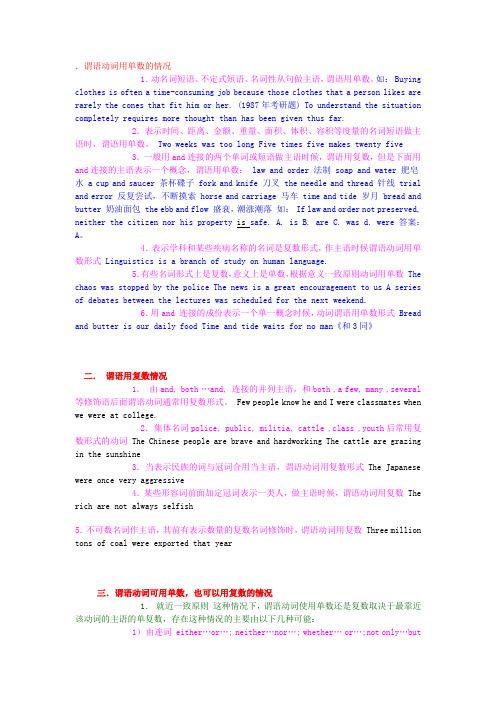
.谓语动词用单数的情况1.动名词短语、不定式短语、名词性从句做主语,谓语用单数。
如: Buying clothes is often a time-consuming job because those clothes that a person likes are rarely the cones that fit him or her. (1987年考研题) To understand the situation completely requires more thought than has been given thus far.2.表示时间、距离、金额、重量、面积、体积、容积等度量的名词短语做主语时,谓语用单数。
Two weeks was too long Five times five makes twenty five 3.一般用and连接的两个单词或短语做主语时候,谓语用复数,但是下面用and连接的主语表示一个概念,谓语用单数: law and order 法制 soap and water 肥皂水 a cup and saucer 茶杯碟子 fork and knife 刀叉 the needle and thread 针线 trial and error 反复尝试,不断摸索 horse and carriage 马车 time and tide 岁月 bread and butter 奶油面包 the ebb and flow 盛衰,潮涨潮落如: If law and order not preserved, neither the citizen nor his property is safe. A. is B. are C. was d. were 答案:A。
4.表示学科和某些疾病名称的名词是复数形式,作主语时候谓语动词用单数形式 Linguistics is a branch of study on human language.5.有些名词形式上是复数,意义上是单数,根据意义一致原则动词用单数 The chaos was stopped by the police The news is a great encouragement to us A series of debates between the lectures was scheduled for the next weekend.6.用and 连接的成份表示一个单一概念时候,动词谓语用单数形式 Bread and butter is our daily food Time and tide waits for no man《和3同》二.谓语用复数情况1.由and, both …and, 连接的并列主语,和both ,a few, many ,several 等修饰语后面谓语动词通常用复数形式。
谓语动词单复数用法

谓语动词单复数用法 Document serial number【KK89K-LLS98YT-SS8CB-SSUT-SST108】谓语动词单复数用法:主谓一致是指:1)语法形式上要一致,即单复数形式与谓语要一致。
2)意义上要一致,即主语意义上的单复数要与谓语的单复数形式一致。
3)就近原则,即谓语动词的单复形式取决于最靠近它的词语,一般来说,不可数名词用动词单数,可数名词复数用动词复数。
There is much water in the thermos.但当不可数名词前有表示数量的复数名词时,谓语动词用复数形式。
Ten thousand tons of coal were produced last year.1 并列结构作主语时谓语用复数Reading and writing are very important.注意:当主语由and连结时,如果它表示一个单一的概念,即指同一人或同一物时,谓语动词用单数,and 此时连接的两个词前只有一个冠词。
The iron and steel industry is very important to our life.2 主谓一致中的靠近原则1)当there be 句型的主语是一系列事物时,谓语应与最邻近的主语保持一致。
There is a pen, a knife and several books on the desk..There are twenty boy-students and twenty-three girl-students in the class.2)当either… or… 与neither… nor,连接两个主语时,谓语动词与最邻近的主语保持一致。
如果句子是由here, there 引导,而主语又不止一个时,谓语通常也和最邻近的主语一致。
Either you or she is to go.Here is a pen, a few envelops and some paper for you.3 谓语动词与前面的主语一致当主语后面跟有with, together with, like, except, but, no less than, as well as 等词引起的短语时,谓语动词与前面的主语一致。
谓语动词单复数用法

谓语动词单复数用法 Company number:【WTUT-WT88Y-W8BBGB-BWYTT-19998】谓语动词单复数用法:主谓一致是指:1)语法形式上要一致,即单复数形式与谓语要一致。
2)意义上要一致,即主语意义上的单复数要与谓语的单复数形式一致。
3)就近原则,即谓语动词的单复形式取决于最靠近它的词语,一般来说,不可数名词用动词单数,可数名词复数用动词复数。
There is much water in the thermos.但当不可数名词前有表示数量的复数名词时,谓语动词用复数形式。
Ten thousand tons of coal were produced last year.1 并列结构作主语时谓语用复数Reading and writing are very important.注意:当主语由and连结时,如果它表示一个单一的概念,即指同一人或同一物时,谓语动词用单数,and 此时连接的两个词前只有一个冠词。
The iron and steel industry is very important to our life.2 主谓一致中的靠近原则1)当there be 句型的主语是一系列事物时,谓语应与最邻近的主语保持一致。
There is a pen, a knife and several books on the desk..There are twenty boy-students and twenty-three girl-students in the class.2)当either… or… 与neither… nor,连接两个主语时,谓语动词与最邻近的主语保持一致。
如果句子是由here, there引导,而主语又不止一个时,谓语通常也和最邻近的主语一致。
Either you or she is to go.Here is a pen, a few envelops and some paper for you.3 谓语动词与前面的主语一致当主语后面跟有with, together with, like, except, but, no less than, as well as 等词引起的短语时,谓语动词与前面的主语一致。
谓语单复数
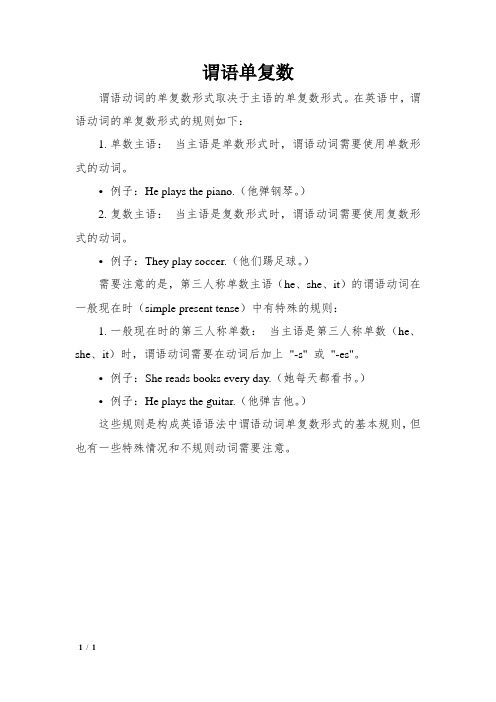
谓语单复数
谓语动词的单复数形式取决于主语的单复数形式。
在英语中,谓语动词的单复数形式的规则如下:
1. 单数主语:当主语是单数形式时,谓语动词需要使用单数形式的动词。
•例子:He plays the piano.(他弹钢琴。
)
2. 复数主语:当主语是复数形式时,谓语动词需要使用复数形式的动词。
•例子:They play soccer.(他们踢足球。
)
需要注意的是,第三人称单数主语(he、she、it)的谓语动词在一般现在时(simple present tense)中有特殊的规则:
1. 一般现在时的第三人称单数:当主语是第三人称单数(he、she、it)时,谓语动词需要在动词后加上"-s" 或"-es"。
•例子:She reads books every day.(她每天都看书。
)
•例子:He plays the guitar.(他弹吉他。
)
这些规则是构成英语语法中谓语动词单复数形式的基本规则,但也有一些特殊情况和不规则动词需要注意。
1/ 1。
如何确定谓语动词的单复数形式

谓语动词和主语allthe employ ees 保持一致。
介词exce pt 是不能影响谓语动词的单复数的。
其他的用法你看看下面的讲述,相信你会懂的II .主语的“数”决定谓语动词的形式。
1.“不可数名词、可数名词单数、单数代词、不定式(短语)、动名词(短语)”或“从句”等作主语,用单数谓语形式。
e.g.①The work is import ant . 这项工作重要。
②To servethe countr y is our duty . 为祖国服务是我们的义务。
③How and why he left was a sad story. 他离开的经过和原因是一段伤心的经历。
2. 复数的名词、代词一般接复数谓语形式。
e.g.①The childr en are takengood care of . 孩子们得到很好的照料。
②They have gone to Chengd u . 他们去成都了。
II. 以“and”或“both…and”连接的并列主语:1.通常作复数用。
e.g.①Plasti cs and rubber neverrot . 塑料和橡胶从不腐烂。
②What he says and what he does do not agree.他言行不一致。
③Both Tom and I are fond of medici ne . 我和汤姆都喜欢医学。
2. 如果并列主语指的是“同一个”人(事、物、抽象概念),作单数用。
e.g.①The worker and writer has come . 这位工人作家来了。
②A cart and horsewas seen in the distan ce . 远处能看见有一套马车。
③Truthand honest y is the best policy . 真诚是最好的策略。
主谓一致谓语动词的单复数形式讲义-高三英语语法一轮复习考点

2024届高三英语高考一轮复习语法考点主谓一致:谓语动词的单复数形式(讲义)谓语动词复数形式以下情况,句中的谓语动词用复数形式1、表示总称意义的词如people,police,cattle,crew,clothes,public 等作主语时,谓语动词用复数。
The police have caught the robber.警察抓住了抢劫犯。
The clothes I wear are much too young for me.我穿的衣服显得过于年轻了。
2、由两部分构成的物体如shoes,trousers,gloves,glasses,scissors,socks,stockings,boots,chopsticks等复数名词作主语时,谓语动词用复数。
My trousers are of good quality.我的裤子质量很好。
Her shoes are under the bed.她的鞋子在床底下。
Your glasses are on your nose.你的眼镜在鼻梁上。
The scissors are very heavy.这把剪刀很沉重。
注意:成双成对的物品前面如与 a pair of连用,谓语动词则往往用单数。
This pair of gloves is amazing.这副手套太神奇了。
There is a pair of stockings on the bed.床上有一双长筒袜。
3、由and或both...and...连接两个人或物,作主语时,谓语动词用复数,且要注意两个单数名词前都有冠词。
You and he are my good friends.你和他是我的好朋友。
An apple and an egg are her breakfast.一个苹果和一个鸡蛋是她的早餐。
Both my mother and my father are working hard.我的妈妈和爸爸都在努力工作。
单复数一致原则的规则与例句

单复数一致原则的规则与例句在英语语法中,单复数一致是一项重要的规则。
它指的是主语和谓语动词在人称和数上保持一致。
正确运用单复数一致原则能够使句子更加准确、清晰,并提高英语表达的准确性。
本文将介绍单数和复数在不同情况下的一致规则,并提供相应的例句加以说明。
一、一般规则1. 主语为单数时,谓语动词需要使用单数形式。
例句:- He walks to school every day.(他每天步行去上学。
)- The cat likes to sleep.(这只猫喜欢睡觉。
)2. 主语为复数时,谓语动词需要使用复数形式。
例句:- They go to the park on weekends.(他们周末去公园。
)- The dogs are barking loudly.(狗们正在大声叫。
)二、特殊规则1. 不可数名词(uncountable nouns)的主语与谓语动词必须一致,使用单数形式。
例句:- The water is refreshing.(水很清凉。
)- Time flies quickly.(时间过得很快。
)2. 连接词“and”连接的两个或多个主语是同一事物或同类事物时,谓语动词需要使用复数形式。
例句:- My brother and I are students.(我和我的哥哥是学生。
)- Apples and oranges are fruits.(苹果和橙子都是水果。
)3. 当连接词“or”连接的两个或多个主语时,谓语动词的单复数形式与最接近的主语保持一致。
例句:- Neither John nor his friends like spicy food.(约翰和他的朋友们都不喜欢辣食。
)- Either the cat or the dog is responsible for the mess.(是这只猫或者是那只狗弄得一团糟。
)4. 当主语是集体名词(collective nouns)时,谓语动词的单复数形式根据具体上下文而定。
如何确定谓语动词的单复数形式

谓语动词和主语all the employees 保持一致。
介词except 是不能影响谓语动词的单复数的。
其他的用法你看看下面的讲述,相信你会懂的II .主语的“数”决定谓语动词的形式。
1.“不可数名词、可数名词单数、单数代词、不定式(短语)、动名词(短语)”或“从句”等作主语,用单数谓语形式。
e.g. ①The work isimportant .这项工作重要。
②To serve the country is our duty . 为祖国服务是我们的义务。
③How and why he left was a sad story . 他离开的经过和原因是一段伤心的经历。
2. 复数的名词、代词一般接复数谓语形式。
e.g. ①The children are taken good care of .孩子们得到很好的照料。
②They have gone to Chengdu . 他们去成都了。
II. 以“and ”或“both… and”连接的并列主语:1.通常作复数用。
e.g. ①Plastics and rubber never rot .塑料和橡胶从不腐烂。
②What he says and what he does do not agree. 他言行不一致。
③Both Tom and I are fond of medicine . 我和汤姆都喜欢医学。
2. 如果并列主语指的是“同一个”人(事、物、抽象概念),作单数用。
e.g. ①The worker and writer has come .这位工人作家来了。
②A cart and horse was seen in the distance .远处能看见有一套马车。
③Truth and honesty is the best policy . 真诚是最好的策略。
3. “and”前、后的单数词语都有“each,every ,many ,a ,no”等修饰时,仍作单数用。
谓语动词用单数复数的情况

谓语动词用单数复数的情况(总3页)-CAL-FENGHAI.-(YICAI)-Company One1-CAL-本页仅作为文档封面,使用请直接删除谓语动词用单数的情况1.动名词短语、不定式短语、名词性从句做主语,谓语用单数。
如: Buying clothesis often a time-consuming job because those clothes that a person likes are rarely the cones that fit him or her. (1987年考研题) To understand thesituation completely requires more thought than has been given thus far.2.表示时间、距离、金额、重量、面积、体积、容积等度量的名词短语做主语时,谓语用单数。
Two weeks was too long Five times five makes twenty five3.一般用and连接的两个单词或短语做主语时候,谓语用复数,但是下面用and连接的主语表示一个概念,谓语用单数: law and order 法制 soap and water 肥皂水 a cup and saucer 茶杯碟子 fork and knife 刀叉 the needle and thread 针线 trial and error 反复尝试,不断摸索 horse and carriage 马车 time and tide 岁月 bread and butter 奶油面包 the ebb and flow 盛衰,潮涨潮落如: If law and order not preserved, neither the citizen nor his property is safe. A. is B. are C. was d. were 答案:A。
- 1、下载文档前请自行甄别文档内容的完整性,平台不提供额外的编辑、内容补充、找答案等附加服务。
- 2、"仅部分预览"的文档,不可在线预览部分如存在完整性等问题,可反馈申请退款(可完整预览的文档不适用该条件!)。
- 3、如文档侵犯您的权益,请联系客服反馈,我们会尽快为您处理(人工客服工作时间:9:00-18:30)。
集合名词作主语,谓语的数如何确定?
1.His family _______ a small one. 2.His family _______ fat and short. A.is,is B.are,are C.is,are
D.are,is
此题应选C。family是一个集合名词,具有单数(侧重指整体)和 复数(侧重指个体)两种可能。类似这种用法的词主要的有: team(队,队员),class(班,班上的全体学生),crowd(人群), government(政府),crew(乘务员),committee(委员会,委员们), audience(听众)等:
1. 集体名词class, family, army, team, club, population, enemy, party, crowd, crew, audience, public , government, majority, group 等作主语。强调整体用单数,指个个成员用复数。 His family is a great one. His family are music lovers. 2. means, works, sheep等词,根据主语表达的概念而定。 The steel works is near the station. Two new steel works are being built.
意义一致的原则
(一)谓语动词为单数的情况
3. one/every one /each/either/ the number+of +复数名词作主语。 Each of the students has a book. 4. clothing, furniture, traffic, jewellery, baggage, equipment, luggage 等无生命的集合名词作主语。 Clothing is badly needed in this flooded area. 5. 以s 结尾的词,但表示学科、国家、机构、书籍、报刊等名称作 主语。 maths, mathematics, physics, politics等。 The United States was founded in 1776. 美国成立于1776年。 The Arabian Nights is very interesting . 《天方夜谭》很有趣。 6. 表示时间、距离、金钱、等复数名词作主语,表达一个整体概念 时。 Twenty years has passed since he left his hometown. (注:如果强调数量,则用复数)
意义一致的原则
(一)谓语动词为单数的情况
7. 由any-,some-,every-,no-和-one,-thing,-body等所构成的不定代词 作主语。 8. 非谓语动词(V-ing, to do)、名词性从句作主语。 Collecting stamps is what he likes. Whatever was left was taken away.
主谓一致
“一致”是指句子成分之间或词语之间在性、数 等方面应保持一致。 “主谓一致”是指谓语动词与主语必须在人称、 性、数上保持一致,即主语是复数,谓语也用复数形 式,如are, were, have等,主语是单数,谓语要用单 数形式,如:is, was, has, works等。 在具体处理一致关系时可遵循以下三原则: 语法一致、意义一致、就近一致。
就近一致原则
1. 由or , either …or, neither…nor, not only…but also 等连接的 并列主语,谓语动词常和靠近的作主语的名词有单复数上保持一致。 Not only he but also I am invited. Neither my gloves nor my hat goes with the dress. 但注意: “with / along with / together with / including / but / except / like / among / as well as / no more than / besides / rather than +名词”置 于主语后,谓语动词一般仍和前面的名词在单复数上保持一致。 The teacher with a number of students is in the classroom. 2. 由there或here引导的句子,主语不止一个词时,谓语动词常 和靠近的作主语的名词有单复数上保持一致。
When and where we will have the meeting has not been decided.
意义一致的原则
(一)谓语动词为单数的情况
9. 单数名词、抽象名词、物质名词作主语。
意义一致的原则
(二)谓语动词为复数的情况
1. 由and 连接的两个并列成分表示两个不同的概念。 Both bread and butter are sold out. 2. people , police, cattle 等集体名词作主语。 The police are looking for the missing child.
意义一致的原则
(三)谓语动词单、复数视情况而定
6.The+形容词/分词作主语,指“一类”人或事物时,常用 作复数用;指“某一个”人,或“抽象的”事物时,作 单数用。 The English speak English. The rejected were heaped in the corner . 废品堆在角落里。 The deceased was his father . The agreeable is not always the useful . 好看的不一定中用。 The new and progressive always wins over the old . 新生、进步的事物总是要战胜旧的东西。
1. Not only I but also Jane and Mary _____ tired of having one examination after another. A. is B. are C. am D. be 2. A library with five thousand books ___to the nation as a gift. A. is offered B. has offered C. are offered D. have offered 3. When and where to build the new factory ___ yet. A. is not decided B. are not decided C. has not decided D. have not decided 4. The number of people invited ___fifty, but a number of them ___ absent for different reasons. A. were; was B. was; was C. was; were D. were; were 5. E-mail, as well as telephones, ___ an important part in daily communication. A. is playing B. have played C. are playing D. play 6. ____ of the land in that district ____ covered with trees and grass. A. Two fifth; is B. Two fifth; are C. Two fifths; is D. Two fifths; are
3. 由山脉、群岛、瀑布、运动会等s 结尾的专有名词作主语。
The Olympic Games are held once every four years. 4. a number of /quantities of /a group of +名词作主语。
Hale Waihona Puke 意义一致的原则(三)谓语动词单、复数视情况而定
但是并不是所有的集合名词都具有以上两种用法: The class consists audience was increasing. teaches it. Thisteam isbut theofin the league.这个队在联赛中打得最好。 It was late, the best 45 students. Mr Green 1. 有的集合名词总是用作单数(不可数):clothing 衣服,poetry 诗 The football team are having baths.足球队队员们在洗澡。 这个班45个学生,由格林先生教。 时间很迟了,但听众人数却在增加。 歌,baggage/luggage 行李,furniture家俱,machinery 机械, Thisaudience were all moved to tears. The class are all diligent. Mr Green teaches them. scenery 景色,jewellery珠宝等。 这个班的学生都很用功,由格林先生教。 听众都感动得流了泪。 2. 有的集合名词总是表示复数意义(但不用复数形式):people人, police警察,cattle牲口等。
意义一致的原则
(一)谓语动词为单数的情况
1. 由and 连接的并列成分指的是同一概念,兼具身份或匹配出现。 The worker and writer is from Wuhan. (那个工人兼作家…) (比较:The worker and the writer are from Beijing. 那位工人和那 位作家) Bread and butter is a daily food in the West. 2. Every … and (every)…, each …and (each)… , no …and (no)… , many a …and (many a)…连接两个单数名词作主语。 Every desk and every chair is made of wood. Many a boy and girl has made the same mistake. 注:主语是many a +n.或more than one+n.时。 Many a child has gone to see her. More than one student has tried this.
